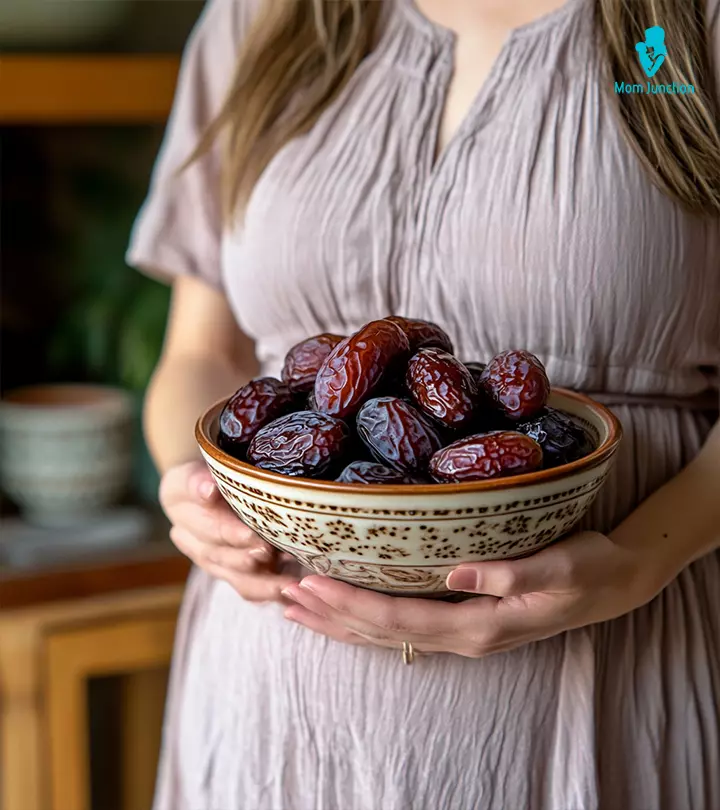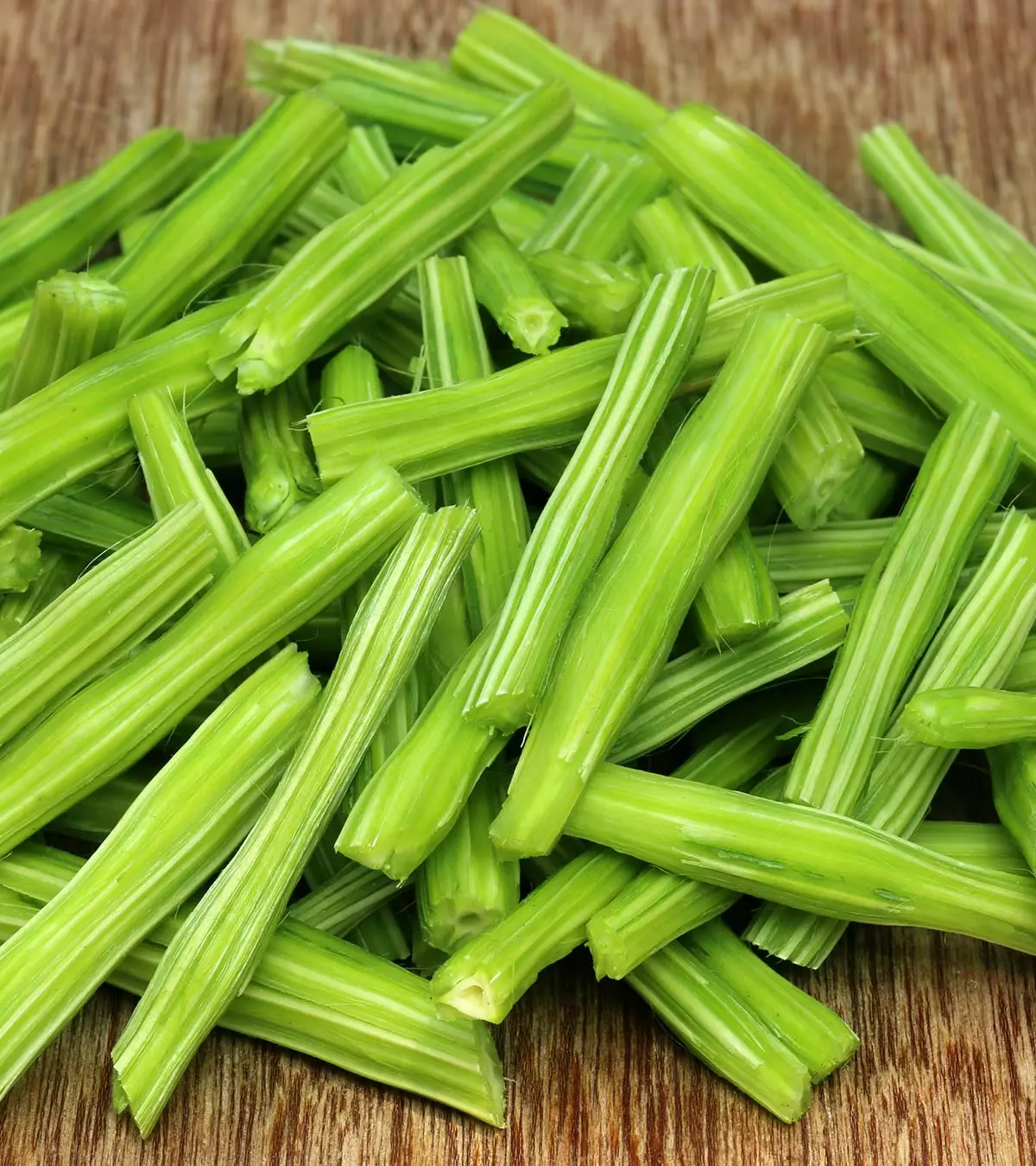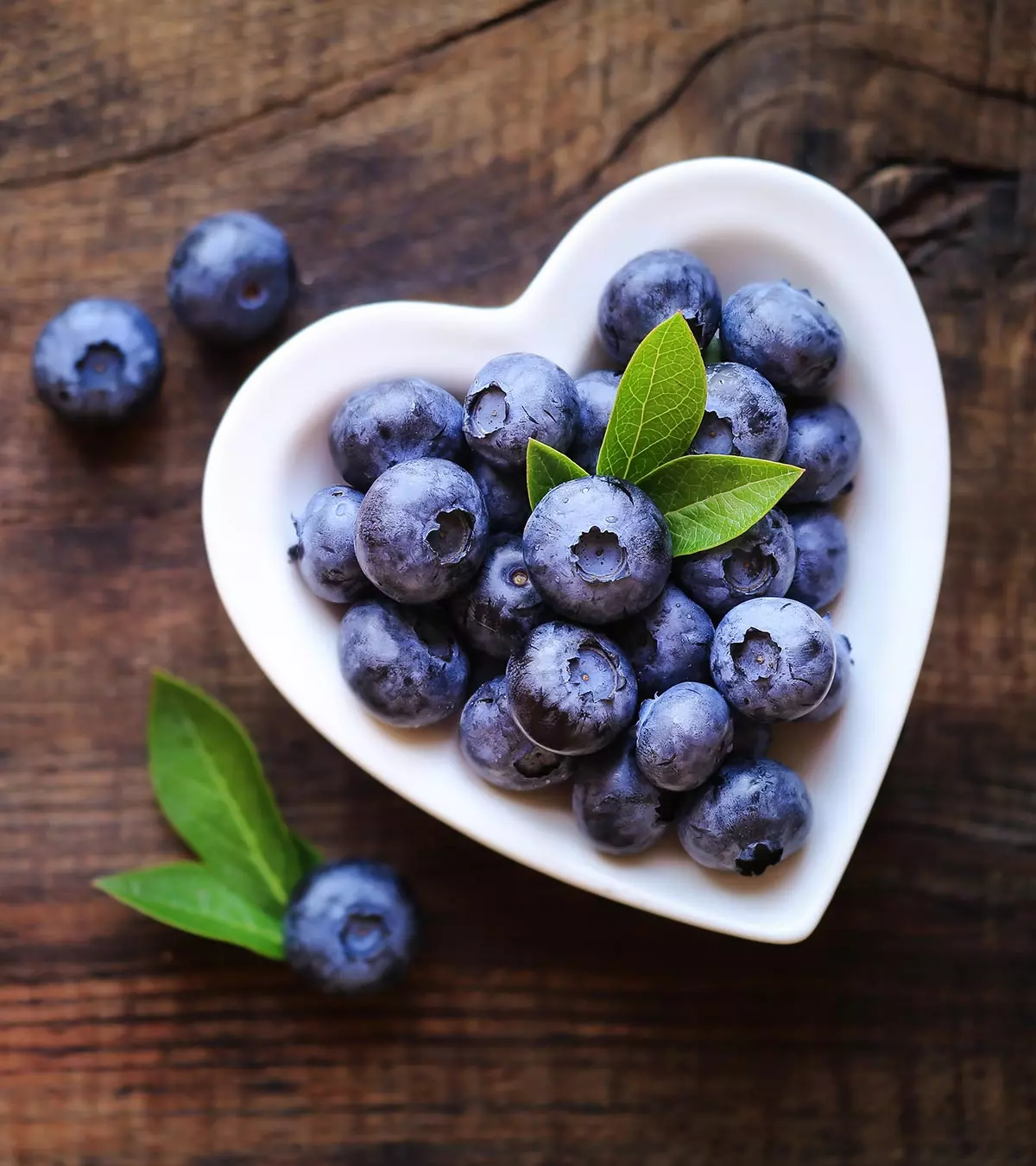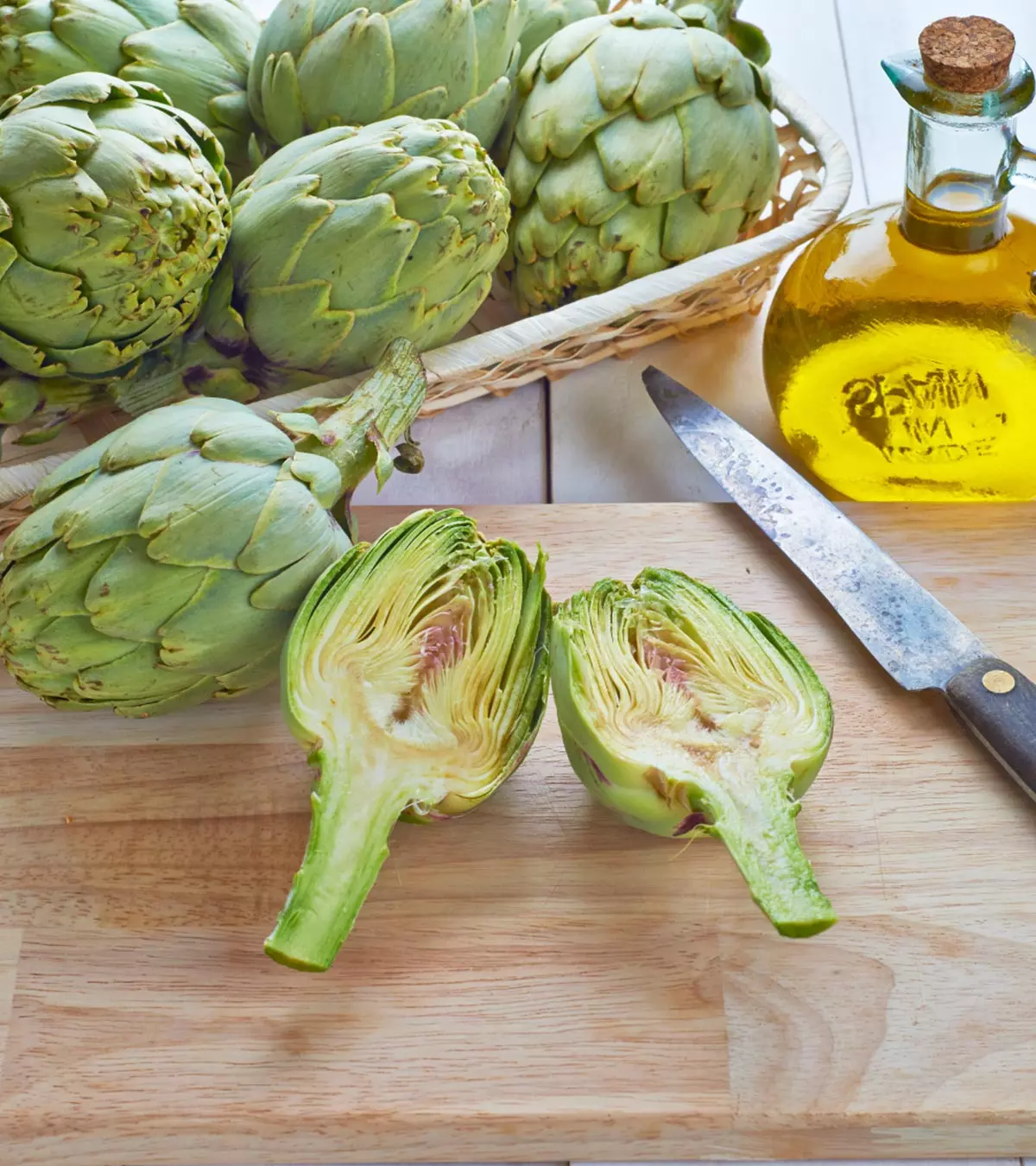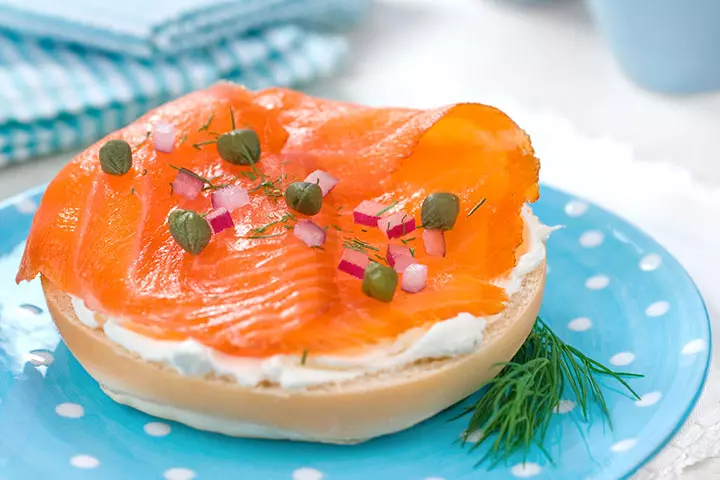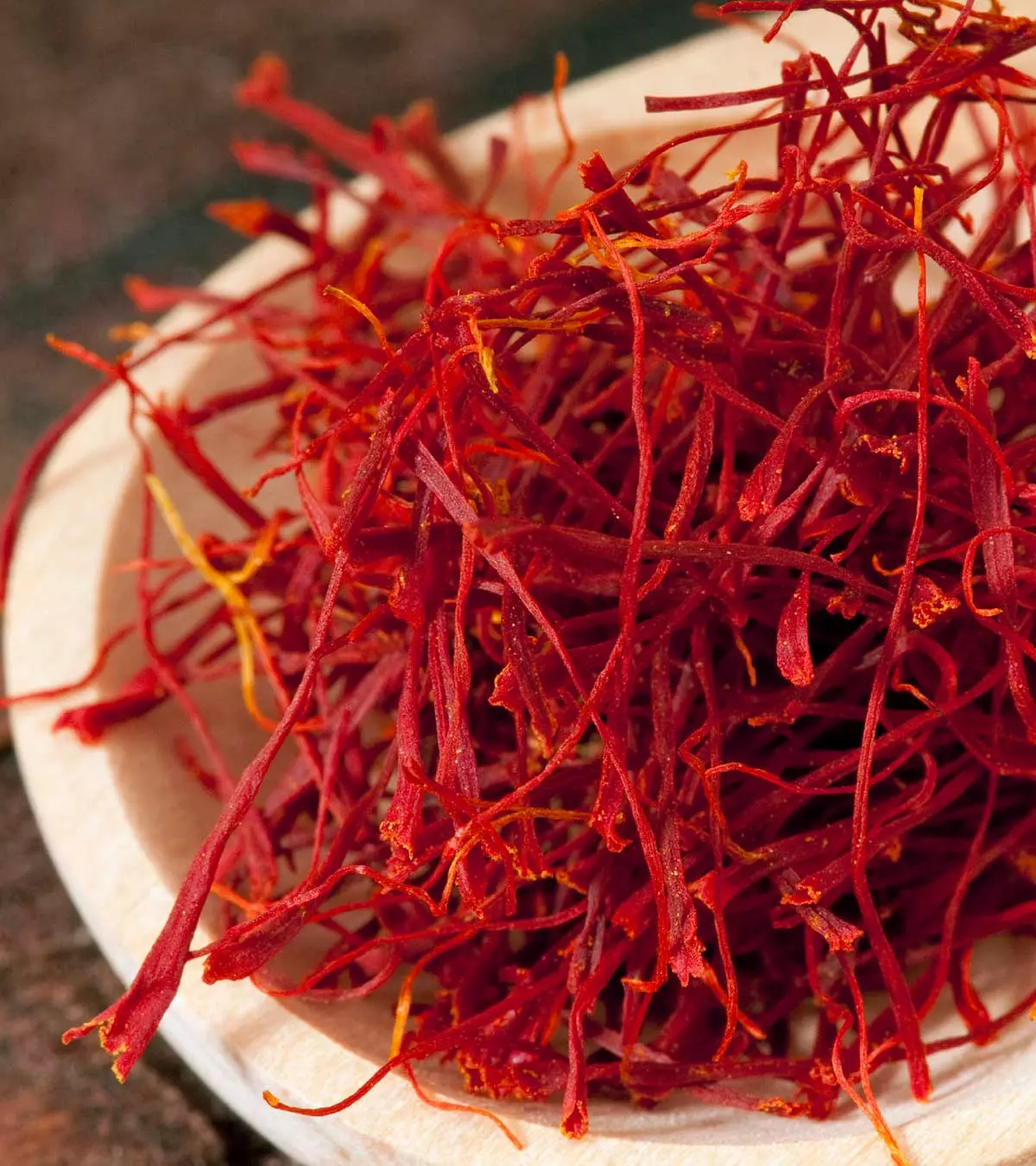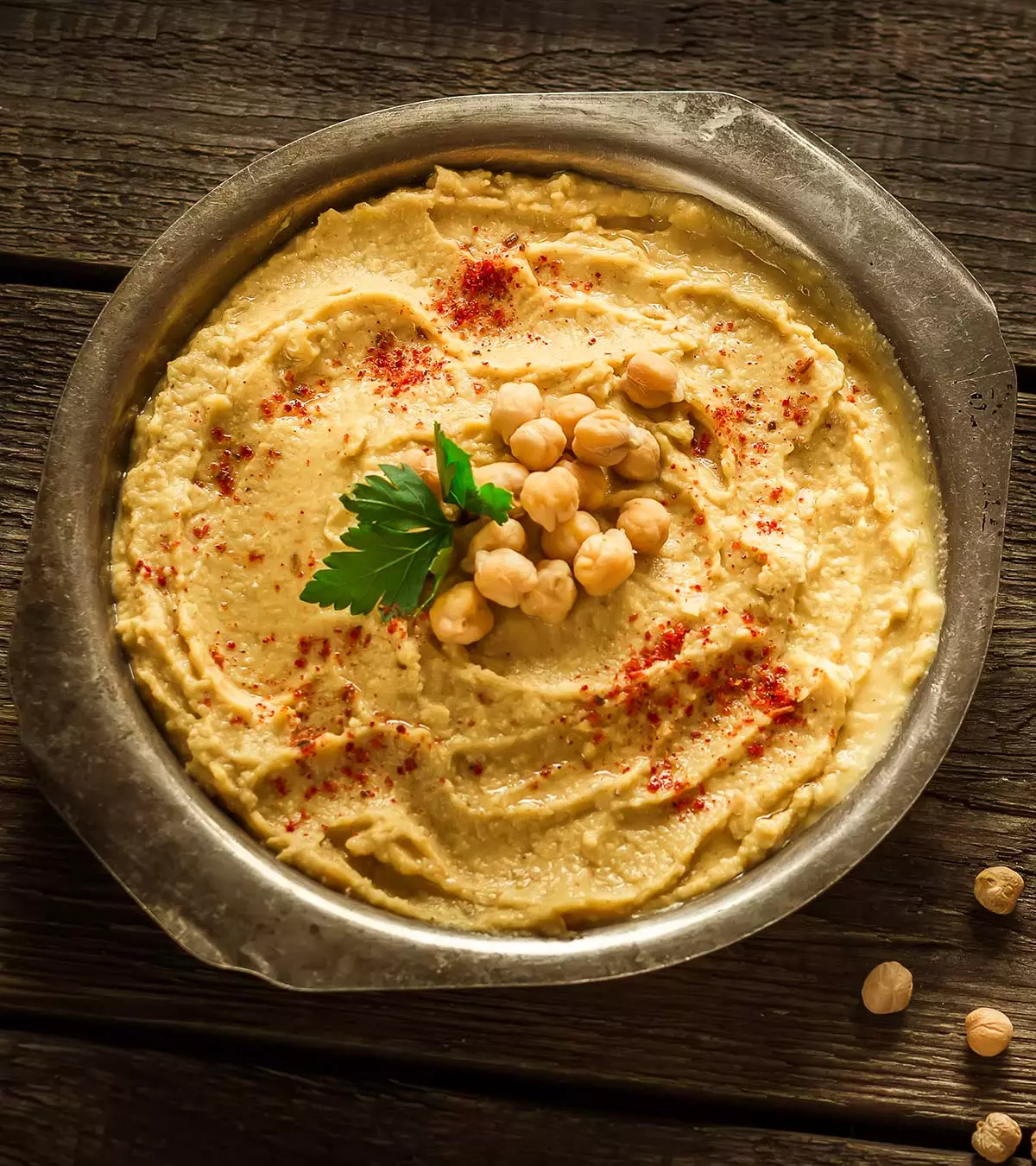
Image: ShutterStock
Whether you can eat hummus during pregnancy or not is worth discussing. Hummus is a creamy dip used to make sandwiches and wraps healthy. It is prepared using boiled chickpeas and is a staple of the Mediterranean diet. However, you can tweak its ingredients to make healthy hummus variations. But while it’s generally healthy, can you eat it during pregnancy? Understanding the nutritional profile of hummus and its ingredients is crucial for pregnant women. This post delves into the benefits, safety concerns, and recommendations for incorporating hummus into your pregnancy diet.

Keep reading as we tell you more about the safety of this Middle Eastern dip for pregnant women, its healthy ingredients, and the possible side effects of hummus that an expecting woman can experience.
Key Pointers
- Hummus is a safe and nutritious addition to the pregnancy diet.
- It is a rich source of folate, calcium, carbohydrates, and fiber that are essential for a healthy pregnancy.
- Pregnant women should prefer homemade hummus over store-bought hummus to avoid the risk of bacterial infections.
- The ideal intake quantity of hummus during pregnancy is one to two tablespoons per day.
- The sauce can be consumed with bread, salads, vegetable sticks, and other snacks.
Is Hummus Safe To Eat During Pregnancy?

Hummus is a smooth spread, made with wholesome ingredients such as chickpeas, tahini (sesame seed paste), and olive oil. This sauce is rich in fiber, protein, omega-3 fatty acids, and low in calories, making it a healthy option for pregnant women (1). The high protein content is helpful for boosting your immunity.
However, it is better to consume fresh homemade hummus, instead of the store-made one. Also, avoid consuming stored or stale hummus that has been refrigerated for too long. Ideally, you should consume it as a dip with healthy snacks and not in huge quantities (2). Consuming hummus in this way also helps manage gestational diabetes.
How Much Hummus Can You Have Per Day?
There is no recommended limit on hummus consumption for pregnant women. However, one to two tablespoons of iron-rich hummus a day would be ideal. You may have it as a spread on a sandwich or as a dip with your vegetable sticks or crackers.
In the next section, we tell you about the nutrients in hummus.
Nutritional Value Of Hummus
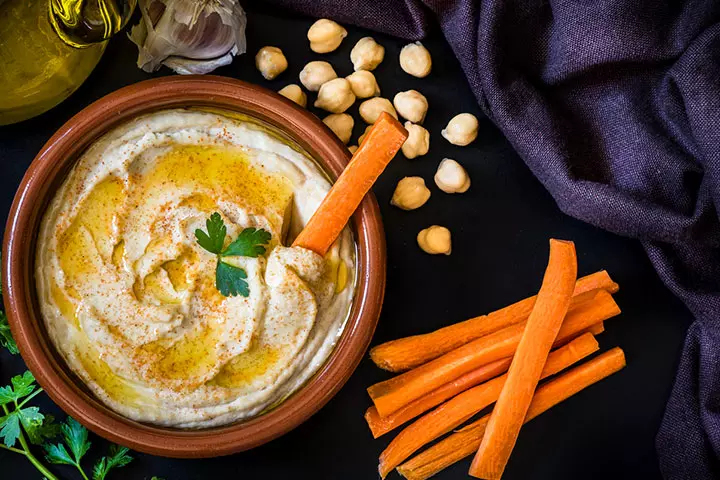
The nutrient value of hummus is as follows (1).
| Nutrient | Value per 100g | |
|---|---|---|
| Calories | 166Kcal | |
| Carbohydrates | 14.29g | |
| Protein | 7.90g | |
| Fiber | 6.0g | |
| Fat | 9.60g | |
| Vitamins | ||
| Vitamin A | 30IU | |
| Vitamin B9 (Folate) | 83μg | |
| Vitamin B6 (Pyridoxine) | 0.2mg | |
| Vitamin B3 (Niacin) | 0.582mg | |
| Vitamin B2 (Riboflavin) | 0.064mg | |
| Vitamin B1 (Thiamin) | 0.180mg | |
| Vitamin B5 (Panthothenic acid) | 0.132mg | |
| Potassium | 228mg | |
| Calcium | 38mg | |
| Iron | 2.44mg | |
| Magnesium | 71mg | |
| Zinc | 1.83mg | |
| Phosphorus | 176mg | |
| Selenium | 2.6μg | |
| Manganese | 0.773mg | |
| Copper | 0.527mg | |
How are these nutrients helpful in pregnancy? Continue reading to know about it.
Nutrients In Hummus That Are Good For Pregnancy
The ingredients used to make hummus are rich in minerals and vitamins, so consuming this dip can be good for your health.
- Fiber: If you are having constipation, then consuming hummus, which is mainly made with chickpeas that are rich in fiber, might help keep your digestive system healthy (3).
- Protein: Hummus is made with chickpeas, a legume rich in protein. High-protein foods like hummus can contribute to your increased protein needs during pregnancy. Besides, they can keep you satiated longer, especially when combined with fibrous vegetables or complex carbohydrates (4). Expecting moms need protein to support the healthy development of the maternal and fetal tissues. The protein also aids in the healthy growth of the fetal brain and other organs (5) (6).
- Folate: When you are pregnant, doctors advise you to take folic acidto support your baby’s health and reduce the risks of neural tube defects. Hummus is a good source of folate, which is a synthetic form of folic acid (7).
- Calcium: This nutrient is good for the development of bones, nerves, muscles, teeth, and heart. Hummus contains calcium, and consuming it could help add to your daily quota of calcium (8). Calcium is also essential for preventing maternal bone density loss during pregnancy.
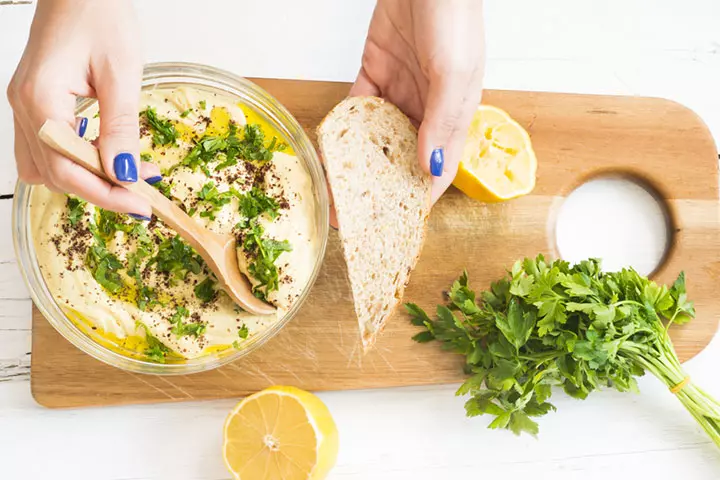
- Carbohydrates: Consuming healthy carbohydrates will help in controlling blood glucose levels. According to National Institutes of Health data, gestational diabetes affects around two to ten percent of all pregnancies in the US, and uncontrolled blood sugar levels may lead to health problems for both mother and the baby. As a low glycemic index snack, hummus could help you meet the carbohydrates requirement and manage blood sugar levels (9).
You do not have to eat for two people when you are pregnant. What matters is whether you are eating right. Adding grain foods such as hummus could help you in gaining the extra energy you require as an expecting mom (10).
However, in some cases, eating hummus can result in side effects.
What Are The Possible Side Effects Of Hummus?

If the hummus is not freshly made, has been kept in the refrigerator for too long or has been purchased from a store, then it may have harmful bacteria called Listeria monocytogenes. Listeria-contaminated hummus can be harmful to pregnant women. In rare cases, there could be health concerns for the babies too. However, with early diagnosis and medications, it is possible to prevent the infection (11).
Eating homemade hummus is the best way to prevent such risks.
 Point to consider
Point to considerHealthy Hummus Recipe To Try At Home
Making hummus takes only a few ingredients and a little time.

You will need:
- 125g dried chickpeas (soaked)
- Lemon juice
- 2tsp tahini (sesame seed paste)
- Garlic cloves
- Water as required
- Salt
How to:
- Boil the chickpeas till they become tender.
- Drain the water and rest it for a while till it cools down.
- Grind the boiled chickpeas, tahini, lemon juice, and garlic in a food processor until mixture becomes a smooth paste.
- You may add some water for a smooth consistency.
- Finally, add some olive oil and salt and give it a final mix.
Foods To Eat With Hummus
Homemade hummus can be used as a salad dressing, dip, or spread with different foods. You can use hummus as a dip with crackers, pita chips, or breadsticks. On the other hand, hummus can be used as a spread to elevate the taste and nutritional value of foods like pita bread/wrap with salad and falafel, sandwiches or tacos, and baked and roasted veggies. Hummus can also complement other foods like cooked meat, eggs, pasta, tofu, and sweet fruits and help make nutritious meals and snacks for expecting women (12) (13).
Serve it with bread, salad, vegetable sticks, and anything to relish its taste and benefits.
 Quick tip
Quick tipFrequently Asked Questions
1. How common is listeria in hummus?
Listeria is very common in hummus. In addition, studies have shown that listeria growth was among the highest in hummus (14).
2. Are carrots and hummus good for pregnancy?
Yes, carrots and hummus provide a great combination of protein, fiber, and healthy fats, and are good for expecting mothers (4).
3. Can hummus help with nausea during pregnancy?
Hummus is a nutritious recipe with fiber and protein that can help replenish the nutrients pregnant women may lose from vomiting during pregnancy. Some pregnant women may find this light on the taste palette, making it a great snack for women with nausea. However, there is no scientific evidence claiming that hummus prevents nausea during pregnancy.
Hummus is one of the healthy and flavorful recipes for pregnant women. It contains proteins, fiber, calcium, healthy carbohydrates, and many other nutrients like zinc, selenium, and magnesium. Eating hummus during pregnancy is good for you and your baby because it helps to keep your digestion optimal and reduces the risk of neural tube defects in the fetus. Since hummus is a nutrient-dense food, adding it to your prenatal nutrition diet allows you to get extra energy. However, remember to eat only fresh homemade hummus, as the one stored in the fridge for a long time may cause bacterial infections, causing adverse health conditions.
Infographic: Nutrients In Hummus That Are Good For Pregnancy
Hummus made from healthy chickpeas can be the whole package of taste and nutrition for your pregnancy journey. So if you want a delicious dip for your veggies, hummus can be an ideal choice. But don’t have it because we said so, have it because it is full of nutrients that benefit your pregnancy, as listed below. Illustration: Momjunction Design Team
Illustration: Is It Safe To Snack On Hummus During Pregnancy?

Image: Stable Diffusion/MomJunction Design Team
Are you wondering if you can consume hummus? Get the answer to this important question and learn more about nutrition during pregnancy with this educational video.
References
1. T. C. Wallace, R. Murray, and K. M. Zelman; The Nutritional Value and Health Benefits of Chickpeas and Hummus; Nutrients (2016)
2. What can I eat? – gestational diabetes; Diabetes UK
3. Surprising Health Benefits of a Fiber-Rich Diet; Intermountain Healthcare (2016)
4. 5 Snack Foods to Eat While Pregnant; John Hopkins Medicine
5. Foods That Should Be on Every Pregnant Woman’s Shopping List; HealthyWomen
6. Pregnancy Superfoods: What to Eat for a Healthy and Balanced Diet; Medanta The Medicity(Global Health Limited)
7. Q&A: Prenatal Vitamins; Family Care Health
8. Evan J Reister, et al.; The Benefits of Including Hummus and Hummus Ingredients into the American Diet to Promote Diet Quality and Health: A Comprehensive Review Nutrients (2025)
9. Gestational Diabetes Meal Planning; Northwestern Medicine
10. Pregnancy and diet; Better Health Channel
11. Listeria Infection (Listeriosis); Mother To Baby (2018)
12. Healthy eating in pregnancy; Nidirect government services
13. Healthy Eating in Pregnancy; Infant and Toddler Forum
14. Listeria monocytogenes growth kinetics in refrigerated ready-to-eat dips and dip components; National Library of Medicine
15. Chickpeas (Garbanzo Beans); Harvard School of Public Health
16. Hummus; Harvard School of Public Health
Community Experiences
Join the conversation and become a part of our nurturing community! Share your stories, experiences, and insights to connect with fellow parents.
Read full bio of Dr. Shikha Sharma
Read full bio of Swati Patwal
Read full bio of Rebecca Malachi
Read full bio of Aneesha Amonz





